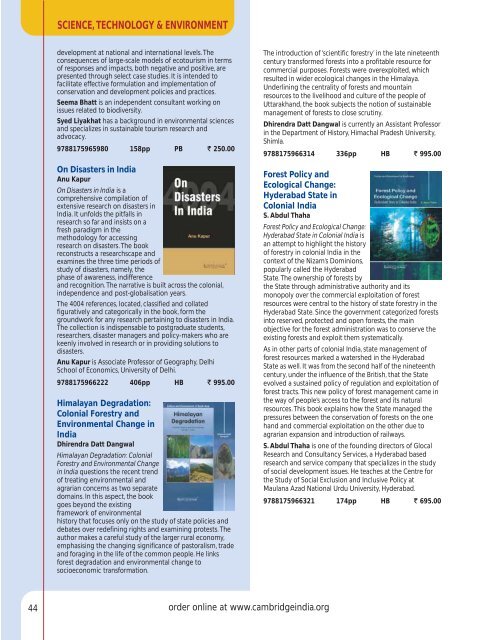India & Cambridge - Cambridge University Press India
India & Cambridge - Cambridge University Press India
India & Cambridge - Cambridge University Press India
- No tags were found...
Create successful ePaper yourself
Turn your PDF publications into a flip-book with our unique Google optimized e-Paper software.
SCIENCE, TECHNOLOGY & ENVIRONMENTdevelopment at national and international levels. Theconsequences of large-scale models of ecotourism in termsof responses and impacts, both negative and positive, arepresented through select case studies. It is intended tofacilitate effective formulation and implementation ofconservation and development policies and practices.Seema Bhatt is an independent consultant working onissues related to biodiversity.Syed Liyakhat has a background in environmental sciencesand specializes in sustainable tourism research andadvocacy.9788175965980 158pp PB ` 250.00On Disasters in <strong>India</strong>Anu KapurOn Disasters in <strong>India</strong> is acomprehensive compilation ofextensive research on disasters in<strong>India</strong>. It unfolds the pitfalls inresearch so far and insists on afresh paradigm in themethodology for accessingresearch on disasters. The bookreconstructs a researchscape andexamines the three time periods ofstudy of disasters, namely, thephase of awareness, indifferenceand recognition. The narrative is built across the colonial,independence and post-globalisation years.The 4004 references, located, classified and collatedfiguratively and categorically in the book, form thegroundwork for any research pertaining to disasters in <strong>India</strong>.The collection is indispensable to postgraduate students,researchers, disaster managers and policy-makers who arekeenly involved in research or in providing solutions todisasters.Anu Kapur is Associate Professor of Geography, DelhiSchool of Economics, <strong>University</strong> of Delhi.9788175966222 406pp HB ` 995.00Himalayan Degradation:Colonial Forestry andEnvironmental Change in<strong>India</strong>Dhirendra Datt DangwalHimalayan Degradation: ColonialForestry and Environmental Changein <strong>India</strong> questions the recent trendof treating environmental andagrarian concerns as two separatedomains. In this aspect, the bookgoes beyond the existingframework of environmentalhistory that focuses only on the study of state policies anddebates over redefining rights and examining protests. Theauthor makes a careful study of the larger rural economy,emphasising the changing significance of pastoralism, tradeand foraging in the life of the common people. He linksforest degradation and environmental change tosocioeconomic transformation.The introduction of ‘scientific forestry’ in the late nineteenthcentury transformed forests into a profitable resource forcommercial purposes. Forests were overexploited, whichresulted in wider ecological changes in the Himalaya.Underlining the centrality of forests and mountainresources to the livelihood and culture of the people ofUttarakhand, the book subjects the notion of sustainablemanagement of forests to close scrutiny.Dhirendra Datt Dangwal is currently an Assistant Professorin the Department of History, Himachal Pradesh <strong>University</strong>,Shimla.9788175966314 336pp HB ` 995.00Forest Policy andEcological Change:Hyderabad State inColonial <strong>India</strong>S. Abdul ThahaForest Policy and Ecological Change:Hyderabad State in Colonial <strong>India</strong> isan attempt to highlight the historyof forestry in colonial <strong>India</strong> in thecontext of the Nizam’s Dominions,popularly called the HyderabadState. The ownership of forests bythe State through administrative authority and itsmonopoly over the commercial exploitation of forestresources were central to the history of state forestry in theHyderabad State. Since the government categorized forestsinto reserved, protected and open forests, the mainobjective for the forest administration was to conserve theexisting forests and exploit them systematically.As in other parts of colonial <strong>India</strong>, state management offorest resources marked a watershed in the HyderabadState as well. It was from the second half of the nineteenthcentury, under the influence of the British, that the Stateevolved a sustained policy of regulation and exploitation offorest tracts. This new policy of forest management came inthe way of people’s access to the forest and its naturalresources. This book explains how the State managed thepressures between the conservation of forests on the onehand and commercial exploitation on the other due toagrarian expansion and introduction of railways.S. Abdul Thaha is one of the founding directors of GlocalResearch and Consultancy Services, a Hyderabad basedresearch and service company that specializes in the studyof social development issues. He teaches at the Centre forthe Study of Social Exclusion and Inclusive Policy atMaulana Azad National Urdu <strong>University</strong>, Hyderabad.9788175966321 174pp HB ` 695.0044 order online at www.cambridgeindia.org
















